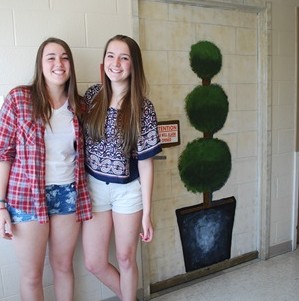Paige and Devan, both 17-years-old, are excited. They are getting ready to go to downtown Toronto to see if they can catch a glimpse of their favourite band, One Direction, who will be arriving at the Rogers Centre soon, ahead of the band’s scheduled concert the following night.
They are like a lot of teenage girls their age. They radiate youthful energy as they candidly and unapologetically profess their love for their favourite One Direction members. And, they are not like other teenagers their age; in fact, they’re not like a lot of people in general.
They are artists, but more importantly, humanitarians, and they have selflessly devoted their past two summers helping to improve the safety and well-being of seniors at The Scarborough Hospital (TSH).
Both gifted with a brush, the girls have painted two exit doors in the Specialized Geriatrics and Medicine unit at TSH’s General campus to camouflage them, so patients with dementia and other behavioural concerns, can’t try to escape the unit, and ultimately, the hospital.
But how did this idea come about and how did Paige and Devan get involved?
It all started with three ladies in the unit – Patient Care Manager for Specialized Geriatrics and Medicine, and Palliative Care, Meredith DePaulson, Nurse Practitioner Tabatha Bowers, and Registered Practical Nurse Julie Morse – who were thinking of ways to make the floor a safer and more attractive area.
“We are always looking for new strategies to keep our patients safe, while observing the hospital’s Least Restraint policy, which outlines that all possible alternative interventions are exhausted before deciding to use restraints on patients at risk of serious harm to themselves or others,” says Tabatha. “Patients on this floor sometimes get confused where they are and it’s dangerous for them to leave the unit on their own. We came up with the idea to disguise the doors, so patients would have a harder time finding them, providing us with another alternative to restraints. As soon as this idea was suggested, Julie enthusiastically proclaimed, ‘my daughter could do that!’”
An idea was born. Julie’s daughter Paige came into the hospital a while later, clutching a portfolio of her art and an extensive business proposal detailing what the project would entail.
“Paige presented her plan to us that she worked on with her cousin Devan.” says Meredith. “Although I could tell that she was nervous presenting, she was professional and thorough, and she told us what she planned on painting on the doors and why, provided research about the unit and how the doors would benefit patients, what paint to use, and all associated costs.”
Weeks later, Paige and her cousin Devan, brought in their painting supplies and blueprints, and got to work.
First starting with the door on the south side of the unit last year, the girls painted a topiary tree, which is reminiscent of trees in the Italian countryside. This past summer, the girls painted a window with a flower box overflowing with pink, yellow and red flowers, so patients on the north side can enjoy a window view, as the unit lacks a window on that side.
The finished results of the paintings are incredible, but Paige says the experience was more rewarding than the finished product.
“Not only did I get to paint; I got to spend a lot of time with my cousin, and I got to give back to the hospital,” says Paige. “It especially made me happy when patients would come up to us and say ‘we love the paintings’. I’m happy that we got to make other people happy.”
Devan nods her head in agreement. “The first year, I saw it as helping out my cousin, but, by the second year, I looked forward to it,” she says and adds “I think that this project shows that our generation isn’t as bad as it’s cracked up to be. We may be young, but we’re interested in making a difference too.”
She isn’t the only one who feels this way. The wife of a patient, whose room is near the north side door, echoed this sentiment.
“Young kids today get a bad reputation and it’s unfair. Here, you have two young, cheerful kids, who care about other people and want to make a difference. They should be proud of what they did. They did this out of the goodness of their hearts,” she says. “It is easy to see where they get their compassionate and dedicated spirits from though, I mean, just look at their mom and aunt, Julie. They have a great role model to look up to.”
Julie has been at TSH for 30 years. She attended the School of Nursing at the hospital and has worked there ever since. Many would say that throughout her career, Julie’s focus has always been about providing excellent and compassionate care to patients.
“Julie is a great role model for her daughter and niece, and it’s no wonder they are the exceptional, giving, young ladies that they are,” says Meredith. “Before the girls even started volunteering here, they had already accumulated 520 of their mandatory community hours; that’s 480 more hours than they need to graduate. These girls didn’t do it for the hours; they did it to help out, like their mom and aunt does every day. They have made the unit a safer and prettier place for patients, and they should be proud.”
Julie beams and adds “I’m really proud of them.”




